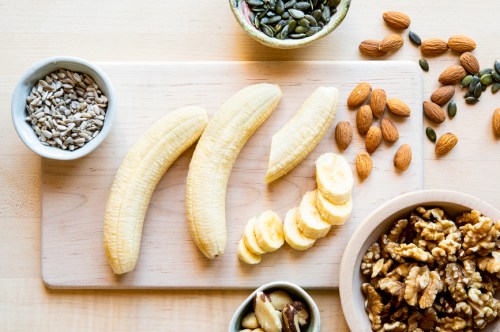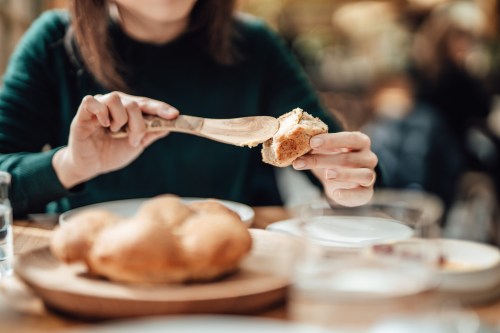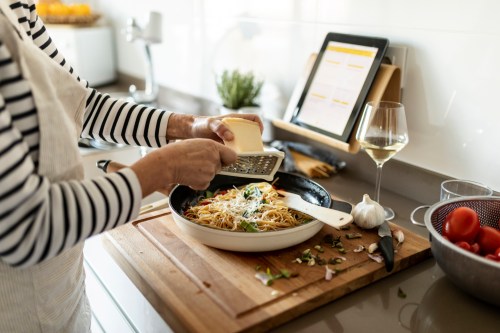Should You Eat a Banana on an Empty Stomach? RDs Share The Pros and Cons
Eating banana on an empty stomach isn't ideal for your blood sugar levels. Learn how and when to eat fruit instead for a natural energy boost.

Bananas and breakfast go hand in hand like peanut butter and jelly. (Or, like bananas and peanut butter.) But according to registered dietitians, chowing down on this potassium-rich fruit might actually not be the meal first thing in the morning. That’s right: eating a banana on an empty stomach is apparently not the best idea from a nutrition standpoint.
Experts in This Article
clinical dietitian and founder of Chelsea Nutrition
registered dietitian and prenatal and postnatal health expert
That’s not because bananas are “unhealthy” or “bad for you,” to be clear. It’s more about the fact that bananas come with a not insignificant amount of natural sugar—nearly 15 grams of sugar per each medium-sized fruit. That’s not a problem on its own per se, since bananas also have fiber, vitamins, and other nutrients your body needs to thrive. But experts say that noshing on a banana first thing in the a.m., before you eat any other food, can potentially mess with your blood sugar levels—impacting your energy, mood, and more.
Don’t worry, we’re not about to tell you to stop eating bananas. (Because that would be bananas!) Instead, we asked dietitians share a few ways to still reap the benefits of this nutritious fruit without triggering a sugar imbalance right at the crack of dawn.
Banana benefits for health and nutrition
1. Bananas are high in potassium
Bananas are packed with tons of nutrition including boatloads of potassium—about 422 milligrams per medium-sized banana. “Bananas are high in potassium which is one of the electrolytes that is essential for bodily functions such as pH balance, water balance in our bodies, blood pressure, digestion, and even muscle contraction,” says NYC-based dietitian Jennifer Maeng, RD. It’s no surprise then why the portable fruit is a popular snack to eat before workouts.
2. They contain gut-friendly fiber
Bananas are also a nice source of fiber, which supports the health of your gut and ensures that you’re, ahem, regular. “The high fiber content improves digestive health and aids in regulating blood sugar levels after meals,” says Charleston-based registered dietitian Lauren Manaker, RDN, LD, CPT. One medium-sized banana gives you about three grams of the nutrient. Keep in mind that the gold standard is roughly six grams of fiber per meal.
3. They contain vitamins and antioxidants that support immune, brain, and metabolic health
Bananas also contain a bevy of vitamins, particularly vitamin C and B6. “Bananas are a good source of vitamin C, which supports immune function, and vitamin B6, which aids in metabolic and brain health,” Manaker says. What’s more, bananas contain anti-inflammatory properties thanks to its antioxidants, which Manaker says can also help give you a midday energy boost. “Antioxidants and are known for their energy-boosting properties, making them a popular choice for a healthy snack,” she says.
4. They help support bone health
Bananas are linked to boosting longevity thanks to their potassium content. Why does that matter? Potassium supports bone health, a key marker of healthy aging. “Eating more potassium is associated with higher bone mineral density, which declines as we age,” Bianca Tamburello, RDN, previously shared with Well+Good.
Can I eat a banana on an empty stomach?
Generally, experts don’t recommend that you eat a banana on an empty stomach because it might mess with your blood sugar levels. “While bananas are nutritious and can provide a quick source of energy in the morning, their high sugar content might lead to a rapid increase in blood sugar levels when consumed alone on an empty stomach,” Manaker says. The subsequent crash in blood sugar levels—which happens after your body recruits a bunch of insulin to handle all the sugar—can then make you tired and wreck your mood. Some people even feel uneasy or anxious when their blood sugar levels plummet.
Yellow bananas on an empty stomach are potentially even worse on an empty stomach than the green, unripe ones. That’s because unripe, green bananas contain more resistant starch and dietary fiber than their ripe, yellow counterparts. “Resistant starch and dietary fiber can be beneficial for gut health, as they promote the growth of beneficial gut bacteria and can also help regulate blood sugar levels,” Manaker says. Think of fiber and resistant starch as buffers for the sugar content in banana, slowing its immediate affect on your body. But as bananas ripen, their fiber content decreases, says Maeng, “making the banana mostly simple sugar which can spike your blood sugar and potentially cause a sugar crash or mild fatigue.”
This isn’t to say that yellow bananas are “bad” and green bananas are “good,” because nutrition is about so much more than two or three nutrients. Because they’re lower in fiber, for example, some people might find yellow bananas easier to digest (green bananas can cause constipation in some people), Manaker says. She adds that choosing between a green and yellow banana ultimately depends on one’s health goals, such as whether the focus is on improving digestion or energy levels.
To err on the side of caution, Maeng suggests simply making sure you’re eating a banana paired with something else. “Your body naturally boosts your blood sugar in the morning and if you are not diabetic, your body will make more insulin to balance out your blood sugar,” she says. “For this reason, morning—or on an empty stomach—is not the best time to eat high-simple-carbohydrate and low-fiber foods.
What are the benefits of eating banana on an empty stomach?
“Eating bananas on an empty stomach can offer specific benefits, such as providing an immediate energy boost,” says Manaker. “The simple sugars in bananas are easily digested, which means you can quickly gain energy, making it an ideal pre-exercise snack or a means to kickstart your day,” she says.
Manaker adds that the potassium in bananas can help kick off your morning with a “heart-healthy mineral that supports nerve and muscle function.” However, she notes that it’s important to assess whether or not you should consume bananas on a case-by-case basis. “It’s essential to consider individual health conditions and dietary needs, as this practice might not suit everyone,” Manaker says.
What is the best time to eat bananas?
Manaker says people shouldn’t be too concerned with the optimal time to eat bananas, because it honestly doesn’t matter that much in the grand scheme of things. “Most Americans aren’t eating the recommended serving of fruit daily,” she says. “We should focus on encouraging people to eat enough fruit before we worry about when you’re eating it. At the end of the day, there’s no ‘bad’ time to eat fruit like bananas,” she says.
Instead, Manaker says people should think more about what they are eating with their banana for sustained energy and satisfaction. “For individuals with sensitive digestive systems or those managing blood sugar conditions, pairing bananas with foods that have healthy fats, proteins, or other fibers can help to moderate their effect [on an empty stomach], and ensure a more balanced energy release,” she says. So of just having a banana solo, consider eating it with peanut butter and whole-grain toast for a more balanced (and satisfying) snack.
One instance, however, where time is of the essence (literally), is consuming bananas before bedtime. In fact, some research suggests that a banana can potentially help you fall asleep faster at night, which might come in handy for someone that struggles to get adequate sleep.
What is the healthiest way to eat a banana?
Like Manaker, Maeng says the healthiest way to eat a banana is by pairing it with sources of fiber, protein, and fat—particularly if controlling blood sugar is a primary goal for you. The next time you’re peeling a banana in the morning, Maeng suggests pairing the fruit with nut butter for the perfect snack or blending them into protein smoothies, like a banana breakfast smoothie or a coffee banana smoothie.
BTW, don’t toss your banana peels! Once you’re ready to unwind for the day, you may want to brew a cup of relaxing banana tea. Surprisingly, banana peels contain high levels of magnesium—even more than the fruit itself—a powerful mineral that helps regulate neurotransmitters that are directly related to sleep, along with other key compounds necessary for achieving a good night’s rest.
Got a few overripe bananas? You know what that means: It’s banana bread time:
Sign Up for Our Daily Newsletter
Get all the latest in wellness, trends, food, fitness, beauty, and more delivered right to your inbox.
Got it, you've been added to our email list.










